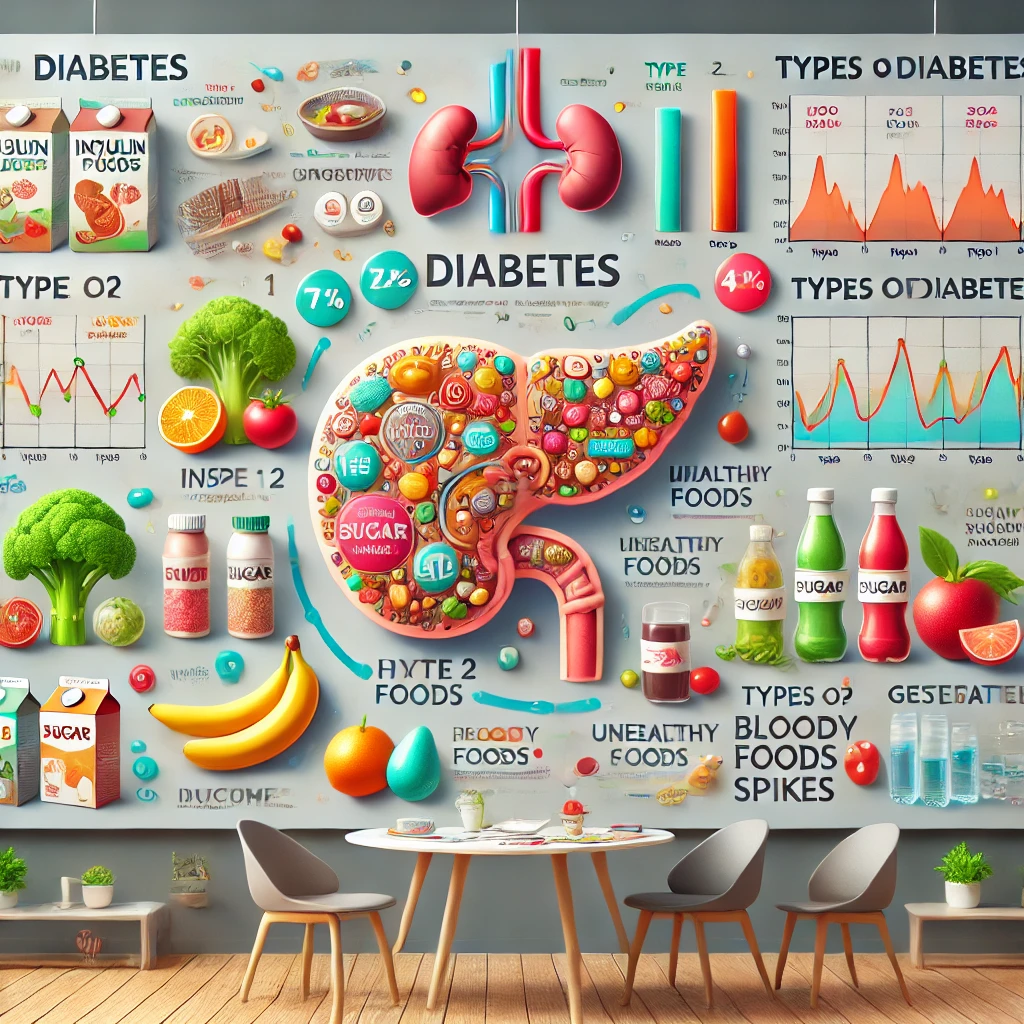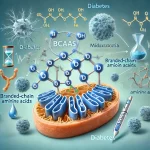Diabetes is a chronic condition characterized by high blood sugar levels resulting from the body’s inability to produce or effectively use insulin, a hormone that regulates blood sugar. If left unmanaged, diabetes can lead to severe complications affecting the heart, kidneys, eyes, and nerves.
Types of Diabetes
- Type 1 Diabetes:
- An autoimmune condition where the immune system attacks insulin-producing cells in the pancreas.
- Usually diagnosed in children and young adults.
- Requires insulin therapy for management.
- Type 2 Diabetes:
- The most common form of diabetes, occurring when the body becomes resistant to insulin or doesn’t produce enough of it.
- Often associated with lifestyle factors such as poor diet, lack of exercise, and obesity.
- Gestational Diabetes:
- Occurs during pregnancy due to hormonal changes that affect insulin sensitivity.
- Usually resolves after childbirth but increases the risk of developing Type 2 diabetes later in life.
- Prediabetes:
- A condition where blood sugar levels are elevated but not high enough for a Type 2 diabetes diagnosis.
- Considered reversible with lifestyle changes.
Why Do We Get Diabetes?
Several factors contribute to the development of diabetes:
- Genetics:
- A family history of diabetes increases the likelihood of developing the condition, particularly in Type 2 diabetes.
- Lifestyle Factors:
- Poor dietary choices, sedentary habits, and obesity are significant contributors to Type 2 diabetes.
- Age:
- The risk increases with age, especially for Type 2 diabetes.
- Hormonal Changes:
- Hormonal imbalances during pregnancy can lead to gestational diabetes.
- Medical Conditions:
- Conditions such as polycystic ovary syndrome (PCOS) or high blood pressure can increase risk.
Is Diabetes Genetic and Unpreventable?
- Genetic Link:
- Type 1 diabetes has a strong genetic component but is also influenced by environmental factors like viral infections.
- Type 2 diabetes is more closely linked to family history and lifestyle.
- Prevention:
- While Type 1 diabetes is not preventable, the onset of Type 2 diabetes can often be delayed or avoided through:
- Healthy eating habits.
- Regular physical activity.
- Maintaining a healthy weight.
- While Type 1 diabetes is not preventable, the onset of Type 2 diabetes can often be delayed or avoided through:
Effects of Processed Foods on Diabetes
Processed foods often contain high levels of sugar, unhealthy fats, and refined carbohydrates, all of which contribute to:
- Increased Insulin Resistance:
- Excessive consumption of refined carbs and trans fats can lead to insulin resistance, a hallmark of Type 2 diabetes.
- Weight Gain:
- Processed foods are calorie-dense and low in nutrients, contributing to obesity, a major risk factor for diabetes.
- Blood Sugar Spikes:
- High-sugar processed foods cause rapid spikes in blood sugar, leading to more stress on insulin production.
Effects of Consuming Too Much Sugar
- Increased Risk of Type 2 Diabetes:
- Excessive sugar intake can lead to obesity, which is closely linked to Type 2 diabetes.
- Insulin Resistance:
- Over time, consuming too much sugar can desensitize cells to insulin, making it harder for the body to regulate blood sugar.
- Pancreatic Strain:
- The pancreas must work harder to produce insulin, potentially leading to its dysfunction.
- Weight Gain:
- Sugary foods are calorie-dense, increasing the likelihood of weight gain and obesity.
Effects of Consuming Too Much Natural Sugar
While natural sugars (found in fruits, honey, and dairy) are healthier than refined sugars, excessive consumption can still have negative effects:
- Caloric Overload:
- Even natural sugars add calories, which can contribute to weight gain if not balanced with physical activity.
- Blood Sugar Spikes:
- Eating large amounts of high-glycemic fruits or honey can cause rapid increases in blood sugar levels.
- Fructose Overload:
- Excessive fructose from natural sources like honey can still strain the liver, similar to processed fructose found in sweeteners.
- Impact on Insulin Sensitivity:
- Overeating natural sugar may impair insulin sensitivity over time.
How to Manage and Prevent Diabetes
- Healthy Diet:
- Focus on whole grains, lean proteins, vegetables, and low-glycemic fruits.
- Limit processed foods and added sugars.
- Regular Exercise:
- Improves insulin sensitivity and helps maintain a healthy weight.
- Monitor Blood Sugar:
- Regularly check glucose levels if you are at risk.
- Stay Hydrated:
- Drinking water helps maintain proper glucose metabolism.
- Avoid Excess Calories:
- Maintain a caloric intake appropriate for your activity level and goals.
By understanding the causes and effects of diabetes and adopting a healthy lifestyle, it is possible to manage or even prevent this condition effectively.










